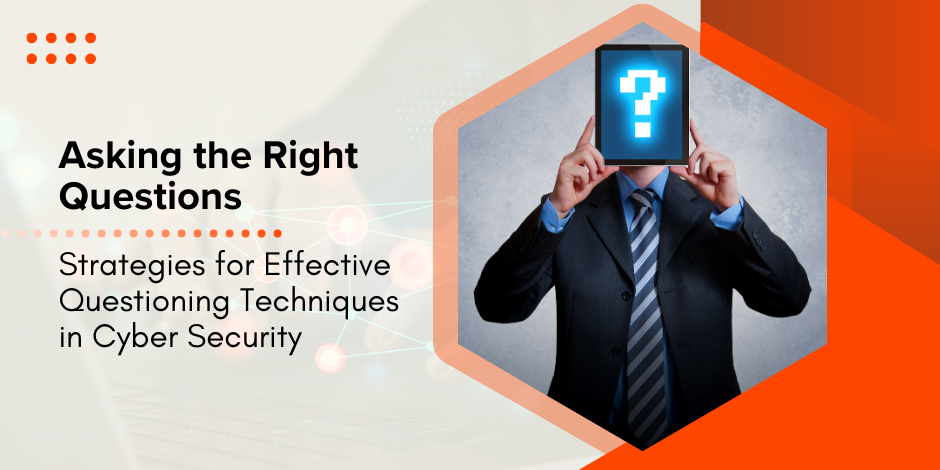Asking the Right Questions: Strategies for Effective Questioning Techniques in Cyber Security

Stay Informed With Our Weekly Newsletter
Receive crucial updates on the ever-evolving landscape of technology and innovation.
In the ever-evolving field of cyber security, asking the right questions is crucial for a robust defence against threats.
Effective questioning techniques in cyber security help identify potential risks and vulnerabilities, contributing to strategic decision-making and incident response.
The importance of effective questioning techniques in cyber security

Questioning plays a vital role in the early detection and prevention of cyber threats.
By asking the right questions, security professionals can gain valuable insights into an organisation’s systems and processes potential vulnerabilities.
Additionally, questioning techniques help uncover hidden risks and identify potential security breaches.
The art of questioning goes beyond just seeking information. It involves a strategic approach to uncovering weaknesses and anticipating potential threats before they materialise.
By fostering a culture of curiosity and critical thinking, organisations can empower their teams to stay one step ahead of cyber criminals.
The role of effective questioning in identifying threats
Effective questioning techniques in cyber security allow professionals to probe deeper into potential threats.
By asking targeted questions, they can uncover patterns, anomalies, and behavioural indicators of malicious activities.
Proactive questioning helps identify warning signs and possible vulnerabilities that automated systems may overlook.
Moreover, the skill of asking the right questions extends beyond technical expertise.
It requires a deep understanding of human behaviour, psychology, and the ever-evolving tactics employed by cyber attackers.
By honing their questioning skills, security professionals can better anticipate and respond to emerging threats in the digital landscape.
How questioning techniques contribute to robust cyber security
Effective questioning techniques in cyber security contribute to a robust security framework by providing valuable insights and mitigating risk.
By asking well-structured questions, security professionals can gather crucial information, assess the severity of a potential threat, and take appropriate remedial actions.
Furthermore, effective questioning can enhance collaboration and communication within an organisation’s security team.
Cyber security professionals can collectively strengthen their defence mechanisms and response strategies by encouraging open dialogue and information sharing through thoughtful questioning.
This collaborative approach improves incident response times and fosters a culture of continuous learning and improvement in the face of evolving cyber threats.
Developing your questioning skills for cyber security

Effective questioning techniques in cyber security require technical knowledge, critical thinking, and communication skills.
As cyber security becomes increasingly crucial in today’s digital landscape, the ability to ask insightful and probing questions is paramount.
Effective questioning techniques in cyber security involve:
- Delving deep into complex technical issues.
- Understanding potential vulnerabilities.
- Anticipating cyber threats before they materialise.
By honing your questioning skills, you can uncover hidden risks, identify weaknesses in security measures, and ultimately strengthen your organisation’s cyber defences.
Key components of effective questioning
Effective questioning techniques in cyber security involve asking specific, relevant, and open-ended questions.
It requires a deep understanding of cyber security concepts, technologies, and best practices.
Additionally, active listening and adapting questioning techniques to different scenarios are essential for success.
Furthermore, mastering the art of questioning in cyber security involves more than technical expertise.
Effective questioning techniques in cyber security require a holistic approach that encompasses cyber security’s technical aspects and human elements.
Understanding user behaviour, social engineering tactics, and psychological aspects of cyber attacks can provide valuable insights for formulating targeted and compelling questions.
Strategies for improving your questioning techniques
Effective questioning techniques in cyber security are improved by continuous learning and practice.
Stay current with cyber threats, industry trends, and emerging technologies.
Discuss with fellow professionals, attend workshops, and participate in relevant training programs to enhance your skills.
Additionally, analyse past incidents and learn from them to refine your questioning approach.
Incorporating diverse perspectives, staying curious, and cultivating a questioning mindset can elevate your cyber security questioning skills.
Embrace a proactive stance towards questioning, challenge assumptions, and strive for a deeper understanding of the ever-evolving cyber threat landscape.
Different types of questions for various cyber security scenarios
Not all questions serve the same purpose in the realm of cyber security.
Different types of questions can be used depending on the specific scenario.
Using open-ended questions in cyber security
Open-ended questions encourage detailed and thoughtful responses.
They help gather information, understand motives, and identify potential risks.
Open-ended questions allow individuals to provide valuable insights and additional context when dealing with incidents or investigating breaches.
Open-ended questions are particularly beneficial in complex cyber security situations requiring a deeper understanding.
By allowing individuals to elaborate on their responses, open-ended questions can uncover hidden vulnerabilities and offer a more comprehensive view of the security landscape.
The power of closed questions in specific scenarios
Closed questions, on the other hand, are effective in extracting specific and concise information.
They can be used in scenarios where time is of the essence or when seeking a direct answer to a specific query.
Closed questions help in quickly narrowing down the focus and obtaining precise information.
In high-pressure cyber security incidents, closed questions are crucial in swiftly obtaining critical details.
By limiting the possible responses, closed questions streamline communication and aid in making rapid decisions to mitigate risks effectively.
Overcoming challenges in questioning within cyber security

Dealing with evasive responses
In the cyber security landscape, individuals may be evasive or reluctant to provide information.
This can hinder the effectiveness of questioning techniques.
To overcome this challenge, it is important to establish trust and create a non-threatening environment.
Building relationships with stakeholders and emphasising the importance of transparency can encourage honest and open responses.
Navigating complex technical jargon
Cyber security professionals often need help understanding complex technical jargon that may confuse or intimidate non-technical stakeholders.
When questioning individuals from different backgrounds or departments, it is important to adapt the language and tone to ensure effective communication.
Understanding this as another fundamental element of effective questioning techniques in cyber security is crucial.
Simplifying technical terms and using analogies can help bridge the knowledge gap and facilitate understanding.
The future of questioning in cyber security
The rapid advancements in artificial intelligence (AI) and machine learning (ML) are poised to reshape how we approach and develop effective questioning techniques in cyber security.
AI-powered questioning systems hold the potential to automate certain aspects of the questioning process, detect abnormalities, and predict potential threats.
The role of artificial intelligence in questioning
AI can assist in analysing vast amounts of data and identifying patterns that may not be immediately apparent to human operators.
Using AI algorithms, sophisticated questioning systems can generate context-aware questions, adapt their approach based on responses, and more efficiently uncover potential risks.
Predicted trends in questioning techniques for cyber security
As technology evolves, we can expect an increased focus on natural language processing and advanced analytics in questioning techniques.
This will enable more human-like interaction with AI-powered systems, making the questioning process more intuitive and effective.
Additionally, incorporating ML algorithms into questioning systems will improve their ability to learn from past incidents and adapt their approach accordingly.
Effective Questioning Techniques in Cyber Security: Conclusion
Knowing effective questioning techniques in cyber security is a vital skill for cyber security professionals.
By developing effective questioning techniques, individuals can enhance their ability to identify threats, assess risks, and respond strategically.
With the future of AI-powered questioning on the horizon, it is crucial for professionals to continually refine their skills and stay ahead of emerging trends in the field.
Ready for a career in cyber security?
The Institute of Data’s Cyber Security Program offers an in-depth, balanced curriculum designed for both IT and non-IT professionals.
To learn more about our Cyber Security Bootcamps, you can download the Cyber Security Course Outline.
Join us to get job-ready for a career as a cyber security expert with extensive resources, a supportive environment, and flexible learning to suit your timetable.
Want to learn more about our programs? Our local team is ready to give you a free career consultation. Contact us today!




